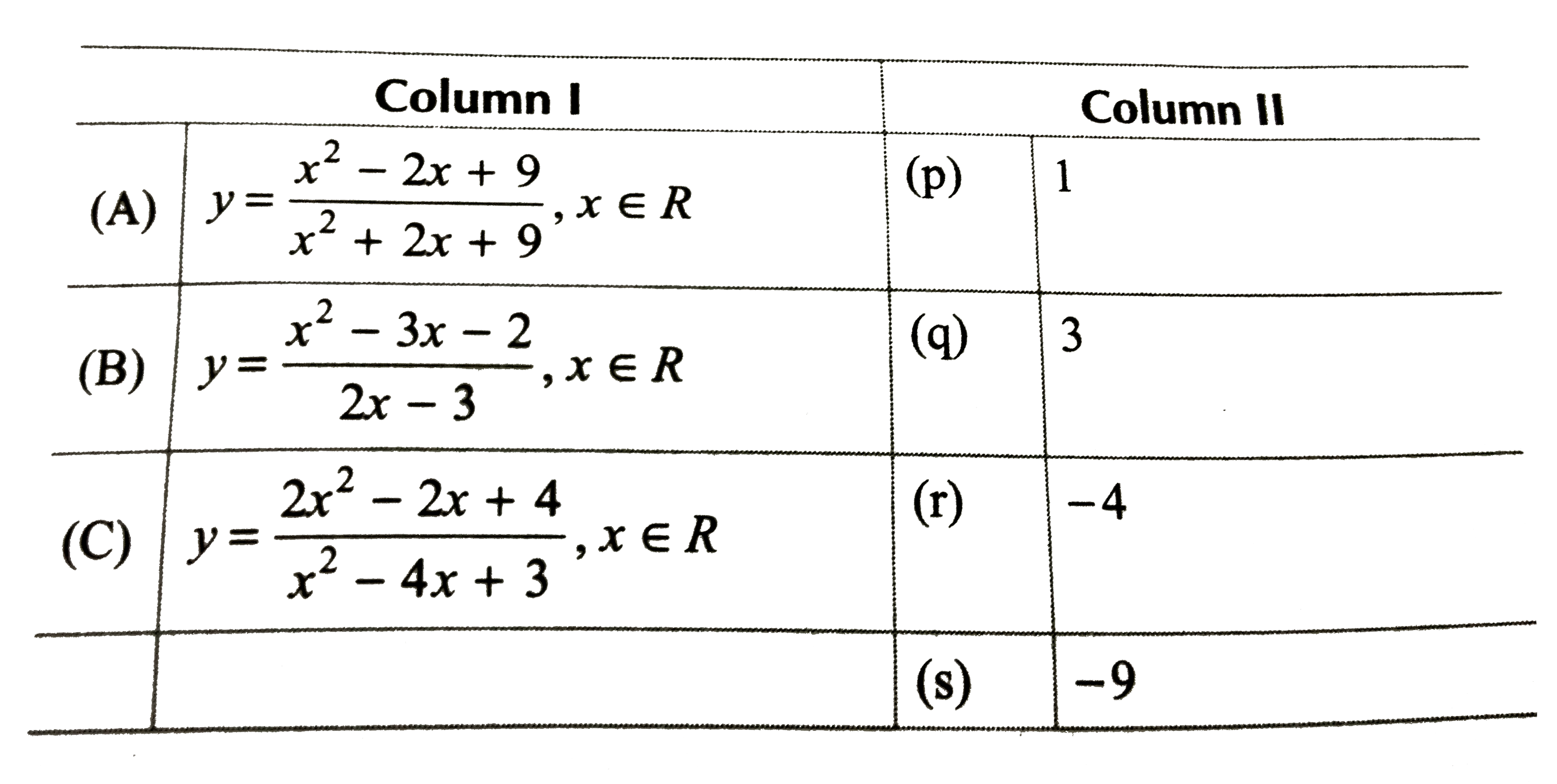If the roots of the equaion x4−12x3+cx2+dx+81=0 are positive then the value of c is The value of d is. Roots of the equation 2cx+d=0 isSolution in Punjabi
−27
−54
−81
−108
The correct Answer is:D
Let roots be α,β,γ,δ>0. ltrgt ∴α+β+γ+δ=12 ltbr> (α+β)(γ+δ)+αβ+γδ=c
αβ(γ+δ)+γδ(α+β)=−d
αβγδ=81
∵AM=α+β+γ+δ4=3
and GM=(αβγδ)1/4=(81)1/4=(81)1/4=3
∴AM=GM
⇒α=β=γ=δ=3
∵αβ(γ+δ)+γδ(α+β)=−d ltbr ∴d=−{3.3.(3+3)+3.3(3+3)}=−108
Topper's Solved these Questions
- THEORY OF EQUATIONSBOOK - ARIHANT MATHSCHAPTER - THEORY OF EQUATIONSEXERCISE - Exercise (Single Integer Answer Type Questions)
10 Videos
- THEORY OF EQUATIONSBOOK - ARIHANT MATHSCHAPTER - THEORY OF EQUATIONSEXERCISE - Exercise (Matching Type Questions)
2 Videos
- THEORY OF EQUATIONSBOOK - ARIHANT MATHSCHAPTER - THEORY OF EQUATIONSEXERCISE - Exercise (More Than One Correct Option Type Questions)
15 Videos
- THE STRAIGHT LINESBOOK - ARIHANT MATHSCHAPTER - THE STRAIGHT LINESEXERCISE - The Straight Lines Exercise 8 : (Questions Asked in Previous 13 years Exams)
1 Videos
- THREE DIMENSIONAL COORDINATE SYSTEMBOOK - ARIHANT MATHSCHAPTER - THREE DIMENSIONAL COORDINATE SYSTEMEXERCISE - Three Dimensional Coordinate System Exercise 12 : Question Asked in Previous Years Exam
2 Videos
Similar Questions
The sum of all the real roots of the equation |x−2|2+|x−2|−2=0 is
View SolutionColumn I contain rational algebraic expressions and ColumnII contains possible integers which lie in their range. Match the entries of Column I with one or more entries of the elements of Column II.

View SolutionIf 0<a<b<c and the roots α,β of the equation ax2+bx+c=0 are non-real complex numbers, then
View SolutionSolve the following system of inequalities graphically
x+5y≤25,2x+2y≥2,2x−2y≤0,x≥0,y≥0
View SolutionConsider the line L1:x−12=y−1=z+31,L2:x−41=y+31=z+32 find the angle between them.
View SolutionIf c,d are the roots of the equation (x−a)(x−b)−k=0 , prove that a, b are roots of the equation (x−c)(x−d)+k=0.
View SolutionLet a,b,c,d be distinct real numbers and a and b are the roots of the quadratic equation x2−2cx−5d=0 . If c and d are the roots of the quadratic equation x2−2ax−5b=0 then find the numerical value of a+b+c+d
View SolutionIf a,b,c,d∈R−{0} , such that a,b are the roots of equation x2+cx+d=0 and c,d are the roots of equation x2+ax+b=0, then |a|+|b|+|c|+|d| is equal to
View SolutionFind the values of a,b,c,d, if 1,2,3,4 are the roots of x4+ax3+bx2+cx+d=0
View SolutionIf c,d are the roots of the equation (x−a)(x−b)−k=0 , prove that a, b are roots of the equation (x−c)(x−d)+k=0.
View SolutionIf the roots of the equation x2+ax+b=0arecandd, then roots of the equation x2+(2c+a)x+c2+ac+b=0 are a c b. d−c c. 2c d. 0
View SolutionThe positive value of k for which the equation x2+kx+64=0 and x2−8x+k=0 will both have real roots, is (a) 4 (b) 8 (c) 12 (d) 16
View SolutionThe positive value of k for which the equation x2+kx+64=0 and x2−8x+k=0 will both have real roots, is
(a)4 (b) 8 (c) 12 (d) 16
View SolutionThe roots of the equation
(a+c−b)x2−2cx+(b+c−a)=0 are
View SolutionLet a,b,c,d be distinct real numbers and a and b are the roots of the quadratic equation x2−2cx−5d=0 . If c and d are the roots of the quadratic equation x2−2ax−5b=0 then find the numerical value of a+b+c+d.
View SolutionIf c,d are the roots of the equation (x−a)(x−b)−k=0 , prove that a, b are roots of the equation (x−c)(x−d)+k=0.
View Solution
